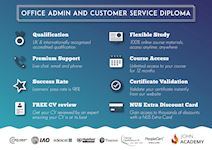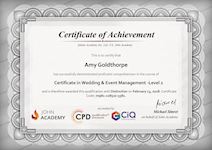Office Admin and Customer Service Diploma - CPD & IAO Accredited
John Academy
Summary
Overview
Office administration and customer service skills are very important for any kind of business. In this course, you will learn the necessary skills, knowledge, and information about office administration and customer service. You will learn how to identify what administrative procedures to be included in your business. This is a series of discussions about administrative and customer service support. You will then learn how large-scale organisations are managed. You will also be able to learn the structures and objectives involved in conducting of admin assistant and customer service.
CPD
Course media
Description
Why choose us?
- Study in a user-friendly, advanced online learning platform;
- All the study materials are available in your student portal including videos tutorials.
- One of the most successful online education platforms in the UK.
- Affordable, engaging & high-quality e-learning study materials;
- You will have unlimited access to online learning platform in 24 hours a day, 7 days a week in 12 Months.
- Efficient exam systems for the assessment and instant result;
- The UK & internationally recognised accredited qualification;
- Access to course content on mobile, tablet or desktop from anywhere anytime;
- The benefit of applying for NUS Extra Discount Card;
- 24/7 student support.
- Technical supports and live chat service for your inquiries. This is very helpful for international learners.
- Excellent and flexible mentor supports by our team of experienced tutors/trainers via email.
COURSE CURRICULUM
Admin Support
- Module One – Getting Started
- Module Two – Getting Organized (I)
- Module Three – Getting Organized (II)
- Module Four – Managing Time
- Module Five – Getting It All Done On Time
- Module Six – Special Tasks
- Module Seven – Verbal Communication Skills
- Module Eight – Non-Verbal Communication Skills
- Module Nine – Empowering Yourself
- Module Ten – The Team of Two
- Module Eleven – Taking Care of Yourself
- Module Twelve – Wrapping Up
Administrative Management
- Module One – Getting Started
- Module Two – Why Your Office Needs Administrative Procedures
- Module Three – Gathering the Right Tools
- Module Four – Identifying Procedures to Include
- Module Five – Top Five Procedures to Record
- Module Six – What to Include in Your Binder (I)
- Module Seven – What to Include in Your Binder (II)
- Module Eight – Organizing Your Binder
- Module Nine – What Not to Include in the Procedure Guide
- Module Ten – Share Office Procedure Guide
- Module Eleven – Successfully Executing the Guide
- Module Twelve – Wrapping Up
Organisational Skills
- Module One – Getting Started
- Module Two – Remove the Clutter
- Module Three – Prioritize
- Module Four – Scheduling Your Time
- Module Five – To Do Lists
- Module Six – Paper and Paperless Storage
- Module Seven – Organization in Your Work Area
- Module Eight – Tools to Fight Procrastination
- Module Nine – Organizing Your Inbox
- Module Ten – Avoid the Causes of Disorganization
- Module Eleven – Discipline is the Key to Stay Organized
- Module Twelve – Wrapping Up
- Organisational Skills Course for Administrator- Activities
Customer Relations and Dealings
- Module One – Getting Started
- Module Two – The Right Attitude Starts with You
- Module Three – Stress Management (Internal Stressors)
- Module Four – Stress Management (External Stressors)
- Module Five – Transactional Analysis
- Module Six – Why are Some Customers Difficult
- Module Seven – Dealing with the Customer Over the Phone
- Module Eight – Dealing with the Customer In Person
- Module Nine – Sensitivity in Dealing with Customers
- Module Ten – Scenarios of Dealing with a Difficult Customer
- Module Eleven – Following up With a Customer Once You Have Addressed Their Issue
- Module Twelve – Wrapping Up
Customer Service: Telephone Etiquette
- Module One – Getting Started
- Module Two – Aspects of Phone Etiquette
- Module Three – Using Proper Phone Language
- Module Four – Eliminate Phone Distractions
- Module Five – Inbound Calls
- Module Six – Outbound Calls
- Module Seven – Handling Rude or Angry Callers
- Module Eight – Handling Interoffice Calls
- Module Nine – Handling Voicemail Messages
- Module Ten – Methods of Training Employees
- Module Eleven – Correcting Poor Telephone Etiquette
- Module Twelve – Wrapping Up
Customer Relationship Management
- Customer Relationship Management
- What CRM Is and Who It Serves
- Checklist for Success
- Requirement Driven Product Selection
- Considerations in Tool Selectio
- Strategies for Customer Retention
- Building the Future
- Homegrown vs. Application Service Provider
- Evaluating and Reviewing Your Program
- The Development Team
Microsoft Office Word
- Module One – Getting Started
- Module Two – Opening
- Module Three – Working with the Interface
- Module Four – Your First Document
- Module Five – Basic Editing Tasks
- Module Six – Basic Formatting Tasks
- Module Seven – Formatting Paragraphs
- Module Eight – Advanced Formatting Tasks
- Module Nine – Working with Styles
- Module Ten – Formatting the Page
- Module Eleven – Sharing Your Document
- Module Twelve – Wrapping Up
Microsoft Office Powerpoint
- Module One – Getting Started
- Module Two – Opening PowerPoint
- Module Three – Working with the Interface
- Module Four – Your First Presentation
- Module Five – Working with Text
- Module Six – Formatting Text and Paragraphs
- Module Seven – Adding Pictures
- Module Eight – Advanced Formatting Tasks
- Module Nine – Working with Transitions and Animations
- Module Ten – Setting Up Your Slide Show
- Module Eleven – Showtime!
- Module Twelve – Wrapping Up
Microsoft Office Excel
- Module One – Getting Started
- Module Two – Opening Excel
- Module Three – Working with the Interface
- Module Four – Your First Worksheet
- Module Five – Viewing Excel Data
- Module Six – Building Formulas
- Module Seven – Using Excel Functions
- Module Eight – Using Quick Analysis
- Module Nine – Formatting Your Data
- Module Ten – Using Styles, Themes, and Effects
- Module Eleven – Printing and Sharing Your Workboo
- Module Twelve – Wrapping Up
John Academy: A Great Place to Learn for Everyone, Forever
Expert Authors: We select authors with expertise and experience of training professionals. Our authors are industry experts, academics, authors, face-to-face trainers or online trainers; most often they have a combination of these backgrounds
Engaging Content: Our succinct, bite-sized and business-focused course materials are designed to deliver the most effective training for you. Each course is made up of modules, manageable learning chunks of text, images, videos and tasks.
Assessment and Certification:
Upon completion of the course, you will be required to sit an online multiple-choice test. Your test will be assessed automatically and the results will be given to you immediately. Before sitting your final exam you will have the opportunity to test your proficiency with a mock exam. After you have successfully passed the final exam, you will be able to order an Accredited Certificate of Achievement at an additional cost of £24 for a PDF copy and £39 for an original print copy sent to you by post.
Who is this course for?
- Professionals, employees or businessmen who want to improve the administration and customer service department of their company.
- People who want to know how administrative management and customer service work.
Requirements
- This course is available to all learners, of all academic backgrounds.
- Learners should be aged 16 or over to undertake the qualification.
- Good understanding of English language, numeracy and ICT are required to attend this course.
Career path
- Accounting Technician
- Admin Assistant
- Bid Writer
- Bookkeeper
- Civil Service Administrative Officer
- Customer Service Provider
- Data Entry Clerk
- Finance Officer
- Hotel Receptionist
- Legal Secretary
- Payroll Administrator
- Liaison Officers
- Supervisor
Questions and answers
Could I give exam and receive a diploma for this course or I have to pay more for exams and diploma?
Answer:Hi Gabriela, Thanks for your query. Upon completion of the course and successfully passing the final exam, you can order your certificate from us. It is available in either hard copy or PDF format. Regards, Help Desk
This was helpful.Hi I would like to know if exam will be taken online
Answer:Hi Bigalle, Thanks for your query. At the end of the course, you will be able to sit a mock exam and then the final exam. Both exams are included in the price, held online and will be in multiple choice format. We give you one year access to your course, therefore, you are able to complete the course at your own pace, in your own time. Regards, Help Desk
This was helpful.
Reviews
Currently there are no reviews for this course. Be the first to leave a review.
Legal information
This course is advertised on reed.co.uk by the Course Provider, whose terms and conditions apply. Purchases are made directly from the Course Provider, and as such, content and materials are supplied by the Course Provider directly. Reed is acting as agent and not reseller in relation to this course. Reed's only responsibility is to facilitate your payment for the course. It is your responsibility to review and agree to the Course Provider's terms and conditions and satisfy yourself as to the suitability of the course you intend to purchase. Reed will not have any responsibility for the content of the course and/or associated materials.




